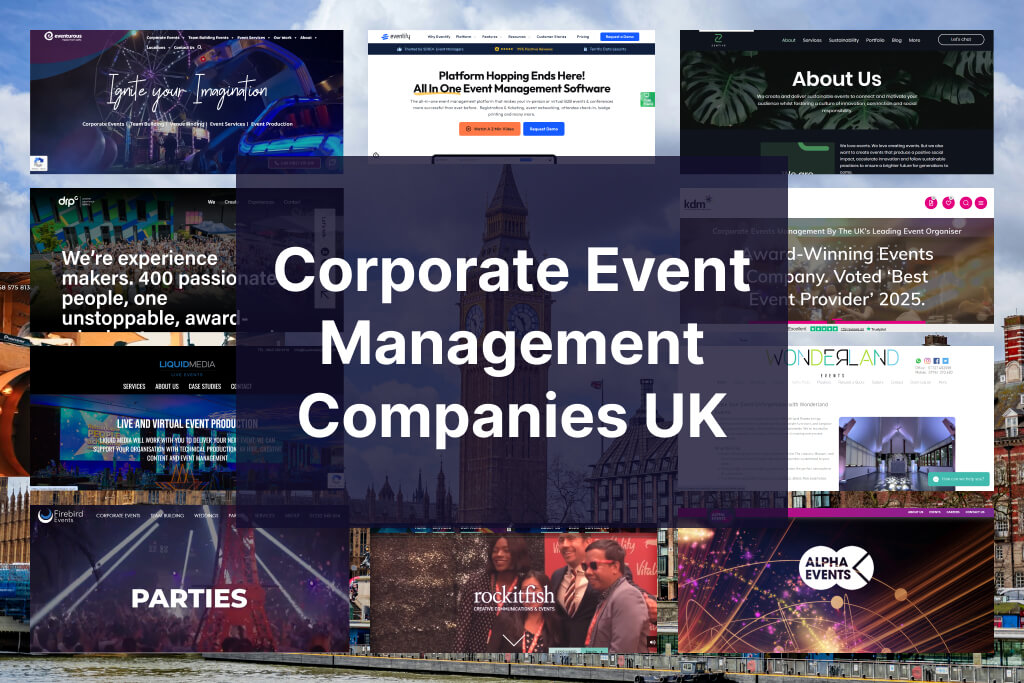By the end of 2019, Facebook will have over 2.4 billion active users. Instagram has also recently crossed the 1 billion user mark, while Twitter has around 350 million people on the platform. The growth of social media networks over the last few years has been remarkably swift - and the 'hashtag revolution' has significantly impacted practically all types of businesses.
Online marketers are increasingly taking to channels like FB, Twitter, YouTube, and Instagram to reach out to more and more people - a global audience. The B2B events industry has also benefited from this sustained rise in the popularity of social media platforms. Here's how event marketers can make use of social media to increase the buzz about their events and conferences.
How To Create Social Media Content For Event Planners
Understanding The opportunities
The first thing an event organizer might ask is, "Why bother with social media?" The answers are pretty simple: channels like Facebook, LinkedIn, and Instagram can be instrumental in boosting nearly all aspects of event planning digitally, right from event marketing (to the attendees) to venue marketing, sponsor exhibitor optimization, and real-time, two-way communications.
Event planners can share high-quality content/tweets on social media channels to engage viewers - to capture new leads. Moreover, new and mutually beneficial business connections can be made through social media (LinkedIn is particularly good for forging corporate connections). There are literally billions of active social media users - and chances are high that many of them will be interested in an upcoming event/conference.
Blending Educational Content with Excellent Networking Scopes
If learning and seamless information sharing with peers and industry leaders are one of the reasons any person attends a business conference, the other reason is smooth networking opportunities. Social media networks like LinkedIn, Twitter, and Facebook give users top-notch openings on both counts.
News and updates about the latest industry trends and research updates can be shared on social media, posted in groups, and even emailed to registered attendees. There can also be official FB or LinkedIn groups for an event, where people can connect and network with fellow attendees and like-minded individuals.
Event planners need to understand and appreciate that most event attendees (if not all) have active social media profiles - and they cannot be ignored.
Creating Branded Hashtags
While planning a corporate event, creating and maintaining a unique brand identity is vital. Digital media in general, and the world wide web in particular, can be a confusing place - and branded hashtags can be important for creating a 'recall value' and ensuring maximum exposure for an upcoming event.
The onus is on an event planner to create, share, and, most importantly, stay consistent with event planner hashtags (no more than 4-5 such hashtags should be used). These hashtags should be used in all regular event updates on social media channels. Once the event is over, the hashtags should also be included while responding to attendee feedback and review.
Social Media Content For Event Planners
As per a recent report, 3 out of 4 people make a purchase decision (in this case, a ticket-purchase decision) after seeing something on social media. Over 60% of people need to see a product more than twice to be sure about their purchase decisions. These stats, in turn, highlight the importance of visually appealing pages/profiles/feeds for business events on social media platforms.
Media content like photos, videos, and small teasers about the upcoming event and images of events organized in the recent past can be shared on LinkedIn and Facebook. On the other hand, Instagram and Facebook can serve as great channels for posting interactive content - polls, surveys, feedback forums, etc.
It's about more than just creating social media profiles for an event...unless they are visually appealing and engaging enough, they are hardly of any use. Note: Event planners must be prompt while responding to user queries, feedback, and suggestions. That would indicate a high level of professionalism and sincerity.
Initiating and increasing the interaction levels. A high level of social participation can shape the success of a corporate event. On social media platforms, things like live presentations and demonstration videos can help in this regard. Live attendee videos also increase the level of interactions. Many organizers include live Q&A sessions and polls on their events' social media pages - and notify the attendees about them.
For people who are not able to/did not attend a conference, full event recordings can be shared on social platforms (Facebook/LinkedIn). On the official event organizer's page on Facebook, live videos can be hosted by exhibitors or partners - which can engage the audience.
The focus should always be on creating posts that people would find interesting, relevant, and worth interacting with. Tracking the latest industry news and updates. There will be times in a year when no events are forthcoming in, say, the next couple of months or so.
Professional event planners can utilize such 'off-seasons' to join Facebook and LinkedIn groups, participate in ongoing discussions, post queries, and generally collect the latest industry information. Following relevant event planner social media posts and hashtags is yet another easy option to stay in touch with what's happening in any particular domain.
Organizers also have the option to conduct surveys, generate insights from the results, and use that data to make their event planning activities more efficient in the future. Social media is not just a platform to share content - it is the best tool to gain knowledge, connect with like-minded peers, and learn how to organize events better.
Note: Following certain company pages, news portals, or profiles of industry leaders also work well - for getting all the latest news in the profile feed. Using each social network uniquely, not all social media are the same. Hence, adopting a 'one-size-fits-all' approach for the social media marketing of an event is likely to fail to work.
Event marketers should use Instagram primarily to visually advertise the upcoming conferences, the topics that will be covered (i.e., the agenda), and even the venue where the conference will be held. Researching and using relevant, high-traffic hashtags with each IG post on the event page is vital.
For sharing short messages, making quick announcements, and following up daily, Twitter is an ideal platform. Planners should use Facebook to publish articles and press releases about their events and upload pertinent images and HQ videos.
LinkedIn is for the more serious-minded, and the more insightful and thought-provoking content should be shared on the platform. To keep the buzz about a soon-to-take place-event alive, event planners must post every day - and the content must be engaging. Note: The number of active LinkedIn users (monthly) is well above 300 million.
It is easy to find and connect with senior-level decision-makers from any industry through various groups. Leveraging word-of-mouth marketing Social media can add a bit of thrust to the attempts for viral event marketing for an event.
The platforms are free, available to everyone, and have excellent reach - making these social networks ideal for users to share opinions, reviews, feedback, interest, queries, and interactions in other forms. Put in another way, social media channels help in building up a mighty useful word-of-mouth publicity drive for any conference or event. Through these portals, registered attendees can be mobilized - and they can also influence their contacts/connections to sign up.
The process is easier than managing a full-blown email or phone marketing campaign. Think of it this way: who is more likely to convince a person to attend an event - a third-party event organizer or an individual (s)he already knows on social media?
Best Practices of Social Media Event Planner Posts
Websites like Facebook, Instagram, and LinkedIn present huge opportunities for event planners to interact with their targeted audience and convert a chunk of them into actual attendees. The key here lies in posting and tweeting daily - and tracking the response to all posts.
For instance, if a certain template or a video format fails to generate enough clicks or interactions, that should be taken as a hint to alter the type of posts or tweets. Analyzing how other event organizers manage their Facebook or LinkedIn pages can also give useful insights.
In an ideal scenario, social media managers of an event should respond to all comments on the posts (irrelevant, abusive, or objectionable comments should be hidden/deleted). On Twitter, interesting news and announcements - things that readers will find beneficial - can be retweeted.
On all social media platforms, user feedback should be closely monitored. Express gratitude for the positive reviews, learn from the negative ones, and never repeat the same mistakes.
Benefitting From Facebook & LinkedIn Groups
Digital tools like mobile event apps generally let attendees build their social communities. Popular LinkedIn and Facebook groups offer the same advantages. In these groups, people and other industry influencers, decision-makers, and growth hackers can easily connect, communicate and collaborate.
Over time, people can create social communities where regular interactions and seamless information transfer occur. In addition, conference planners can share their social media feeds on their mobile event apps as well. Let the visitors communicate with each other is vital - and social media allows them to do just that.
Initiating a Bandwagon Effect
If an event planner or venue owner is very active on social media platforms and responsive to user queries, they and their brand get an additional air of credibility. This form of 'social proofing' makes people feel more inclined to participate in a particular event. Reviews of previous events (the positive ones) can be shared on FB, LinkedIn, and Instagram.
As already highlighted, glimpses from past events also need to be shared - both on the official website and social media channels. When a person sees that many professionals attended the previous edition of an industry event - (s), he automatically feels that the upcoming edition will be worth attending. Reinforce this feeling with repeated posts and positive reviews.
Avoiding The Risks
Adopt a 'too-casual' approach while promoting an event on social media - the results can be seriously counterproductive. Things like poor quality, blurred images, spelling errors, and even incorrect tags are likely to create a negative impression in the minds of prospective attendees.
SMM research reports have found that low-quality content is one of the biggest reasons users get disengaged and drop off. Avoid sharing anything that might have political or social, or cultural connotations. For event planners, at least, not all types of publicity are 'good publicity.'
Finally, The Benefits
There are many ways in which an active social media presence can take event marketing activities to the next level. The total volume of web traffic (i.e., people redirected from social media portals to the event website) can be increased manifold; organizers get the flexibility of selecting from paid and free marketing plans, and the reach and awareness about an upcoming event can be maximized, organizers can directly interact with prospective attendees/interested individuals.
Event planners need to customize the look and feel of their social media - and the posts shared over there - based on the precise nature of their events. An event website and app are key for promoting a business conference, but having a strong social media marketing plan is also critical.
Social media channels are all about building a strong professional reputation and credibility for event planners while building up exposure to upcoming events and conferences. Taken together, these social media platforms form an integral component of paperless event promotions - and, when managed well, they can pave the way to higher event ROI figures.







.png)






